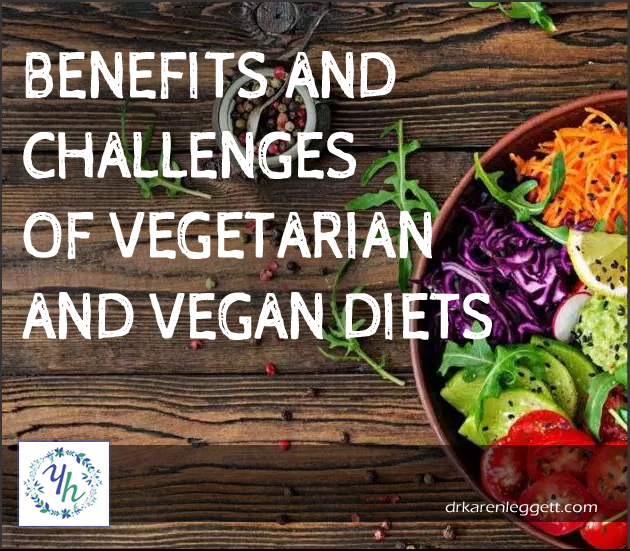Benefits and Challenges of Vegetarian and Vegan Diets

The key to a nutritionally sound strict vegetarian and vegan diets is variety.
A healthy and varied vegan diet includes fruits, vegetables, plenty of leafy greens, whole grain products, nuts, seeds, and legumes.
Benefits:
Vegetarian and vegan diets have been associated with lower blood pressure, cholesterol, heart disease, obesity rates and even certain cancers such as colon cancer and prostate cancer. Some specific nutritional benefits related to the healthy aspects of a vegetarian diet are:
Higher Fiber:
Plant foods such as whole grains, beans, legumes, fruits, vegetables, and nuts provide dietary fiber. High intake of dietary fiber may reduce your risk of developing heart disease, diabetes, premenstrual syndrome, and colon cancer.
Higher Antioxidants:
Fruits and vegetables contain high amounts of vitamin C, vitamin E, and carotenoids, all of which act as antioxidants, protecting your cells from the damaging effects of free radicals.
Higher Phytonutrients:
Plant foods contain a variety of unique nutrients such as phytoestrogens, indoles, isothiocyanates, and flavonoids. Emerging research indicates that these nutrients may help prevent cancer, heart disease, and other degenerative diseases.
It is also important to note that research also suggests that the health benefits of vegetarian diets are due, also in part, to other healthy lifestyle choices that often accompany vegetarianism, such as increased physical activity and not smoking.
So what are the specific challenges of strict vegetarianism and veganism?
Strict Vegetarians and Vegans are most definitely at higher risk of osteoporosis, with increased risk of bone fractures, memory loss and other nerve diseases, and immune suppression, due to the specific nutrient challenges related to the inadequate consumption and absorption of the following micro and macro-nutrients.
1. Calcium
2. Vitamin D
3. Zinc
4. B12
5. Iron
6. Protein (Yes, protein – regardless of what you’ve read on the first 10 websites that pop up when you Google it!)
7. Fat (Yes, fat! – especially DHA and EPA – our essential fatty acids for brain and cardiovascular health!)
Let’s take a look at these!
Many plant foods, such as whole grains and legumes (beans, peas, lentils, peanuts), are good sources of minerals. However it is easier for your body to absorb minerals like calcium, zinc and iron from animal foods than it is from plant foods.
And because bone loss is a major concern for women, let’s take a look at Calcium, Zinc, and Vitamin D first since these nutrient deficiencies increase the risk of osteoporosis.
Calcium:
Calcium is needed for strong bones, muscle function, vascular contraction and vascular dilation, nerve transmission, intracellular signaling, which is communication between cells, and hormonal secretion.
Ninety-nine percent of the body’s calcium is stored in the bones and teeth. Since body functions dependent on calcium are so important for survival, when dietary calcium is too low, the body senses a lack of calcium being absorbed into the blood stream and will then take the calcium it needs from the bone so that the vital organs will have the adequate amount of calcium it needs to function safely.
These tasks are so important for survival, that, when dietary calcium is too low, calcium will be lost from bone and used for other critical functions. Since the body is able to tightly control calcium in the blood like this, measuring blood calcium levels cannot assess calcium status and will instead show normal levels. Abnormal calcium levels are always in need for further investigating as other medical conditions are more likely a problem.


Leave a comment